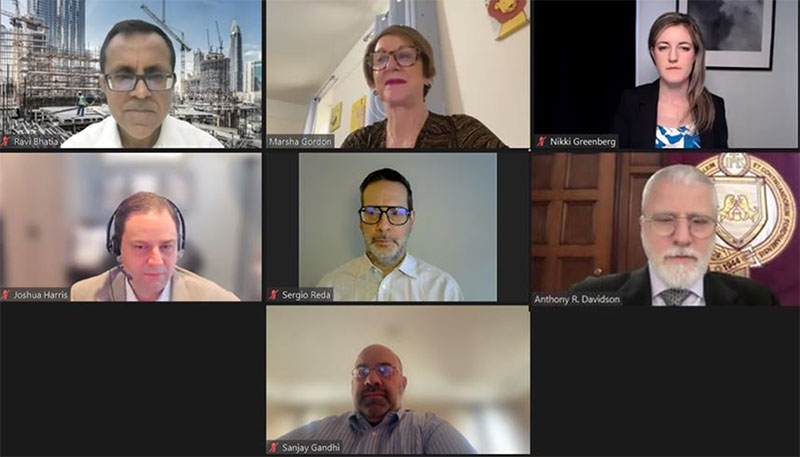Real estate, tech leaders speak on AI at Fordham REI, Business Council of Westchester forum

New York, NY Artificial intelligence, or AI, is impacting virtually every industry, offering opportunities to transform business as usual. Understanding the technology and how best to leverage its potential in real estate was the topic of an in-depth forum last week hosted by Fordham University’s School of Professional and Continuing Studies and The Business Council of Westchester.
“Revolutionizing Real Estate: The Smart Solutions of AI” was presented virtually April 4 and featured Nikki Greenberg, founder and chief innovation officer, Real Estate of the Future; Ravi Bhatia, business development manager, Skanska USA Civil, and adjunct professor, Fordham Real Estate Institute (REI); Sanjay Gandhi, senior managing director, property management, Besen Partners; and Serge Reda, co-founder, AlphaRithm AI, and adjunct professor at Fordham REI and chair of its Technology Committee. The discussion was moderated by Dr. Joshua Harris, executive director of Fordham REI and managing partner of Magnolia Hill Partners.
Greenberg set the stage by presenting an overview of AI’s rapid evolution — including generative AI and the rise of ChatGPT — and how business professionals can leverage technological advancements.
“We’re at a turning point in terms of where technology is and the impact it is going to have. Is AI revolutionary? I believe it is. But, while the technology is getting better, human beings should not be flatlining – we all have to evolve along with this,” she cautioned.
“AI is math, not magic,” Greenberg said. “There’s an algorithm behind the scenes, a set of instructions. It relies on information it’s given to make an analysis. If you give it wrong information, it’s going to give you a wrong outcome. We need to be thinking about the quality of data we give to AI to enable it to give us a quality outcome.”
Harris asked the panel what will be AI’s single, most consequential impact on the real estate world.
“I see great opportunities to improve efficiencies and reduce risk,” said Bhatia. “We’ve all gone through the supply-chain shocks of a post-Covid world. As information becomes more readily available, there’s going to be more transparency in pricing, in terms and conditions, and in streamlining contracts. That’s huge. If we can reduce transaction costs, improve safety and improve efficiencies in the supply chain, it is going to be game-changing.”
Gandhi agreed. “The advantages we see are in automating the mundane, repetitive tasks we do in our industry. A lot of the research tools can be automated, and, if we can reduce transaction costs – that’s great. These are exciting times. But, real estate has been traditionally a hand-shake industry and that is going to be one of the challenges.”
Reda pointed to real estate investing and development as an area where AI could have a significant impact, in terms of identifying opportunities and reducing risks. “Investing in real estate is an enormous investment so it requires a lot of information and analysis. AI could be extremely impactful in the incorporation of data that humans are just not capable of analyzing on their own. Those who can leverage that kind of capability will have an advantage in the market.”
The panel also addressed one of the most common concerns related to AI: potential job loss.
“Jobs are going to evolve,” said Greenberg. “We’re going to learn to use new tools. Some will lean in, others won’t. What we’re going to see with AI is a combination. AI is great at crunching numbers, analysis very quickly. Humans are great at relationships, trust, and ambiguity. Combine them, and you’re super-charged.”
“AI can do the back-office work you need to better communicate with your clients, partners and tenants, but it’s not going to replace the human interaction,” Gandhi said. “You still need to be on top of the game.”
“As with any new technology, or idea, there are going to be people who adopt it and those who don’t,” said Reda. “It’s a choice to learn or not learn. There’s no right or wrong, but AI is here to stay. Those who embrace it and push it forward will enjoy a competitive advantage.”
“Artificial intelligence is impacting every industry,” said Business Council of Westchester President and CEO Dr. Marsha Gordon. “We’re delighted to partner with Fordham’s School of Professional and Continuing Studies and its Real Estate Institute to explore strategies and innovative solutions to maximize AI’s potential.”
“We’re proud to collaborate with The Business Council of Westchester and share these important conversations with our colleagues in the business community,” said Dr. Anthony Davidson, dean, Fordham University School of Professional and Continuing Studies. “Artificial intelligence is reshaping the commercial real estate landscape and we want to support business professionals and prepare future industry leaders to leverage AI’s potential.”
AmTrustRE completes $211m acquisition of 260 Madison Ave.


AI comes to public relations, but be cautious, experts say - by Harry Zlokower

Strategic pause - by Shallini Mehra and Chirag Doshi

Behind the post: Why reels, stories, and shorts work for CRE (and how to use them) - by Kimberly Zar Bloorian









.jpg)
.gif)
.gif)